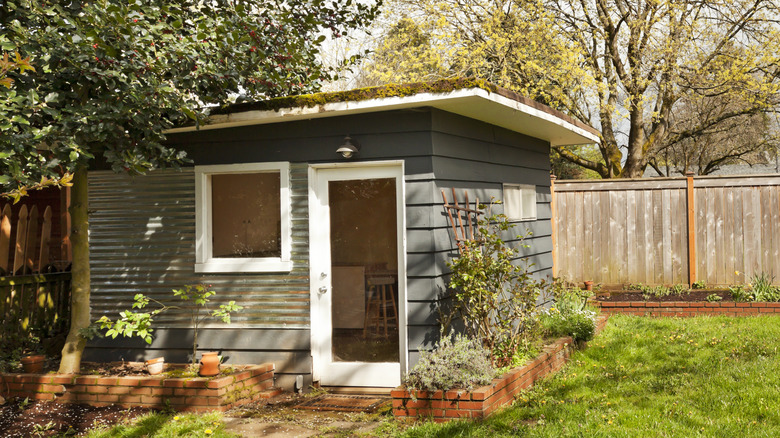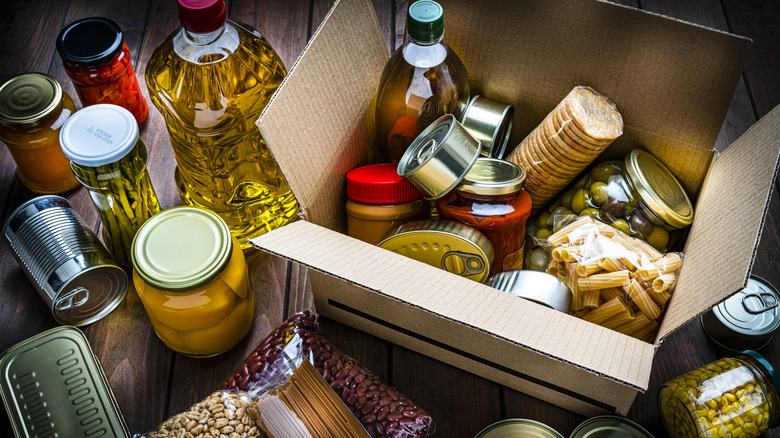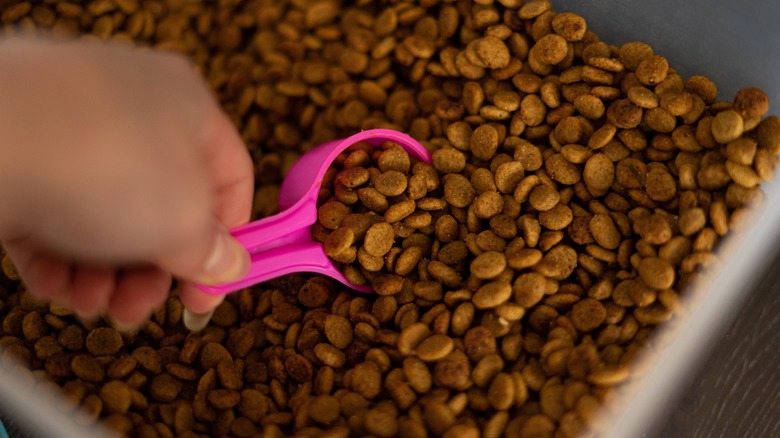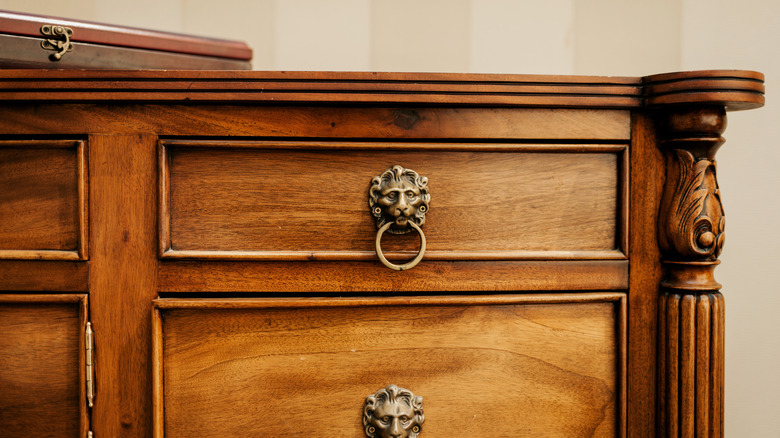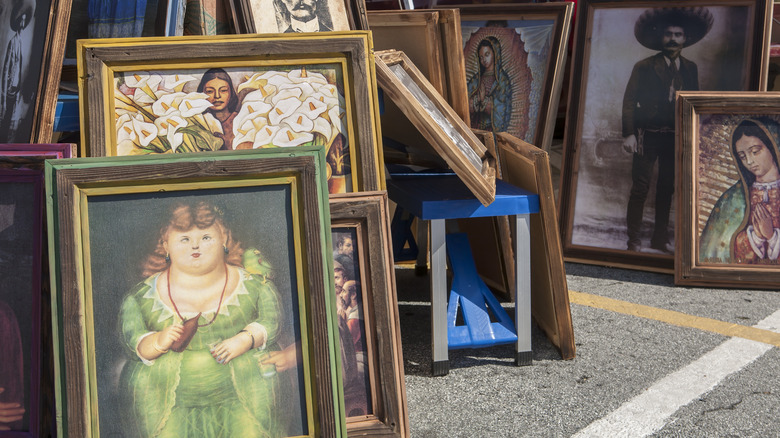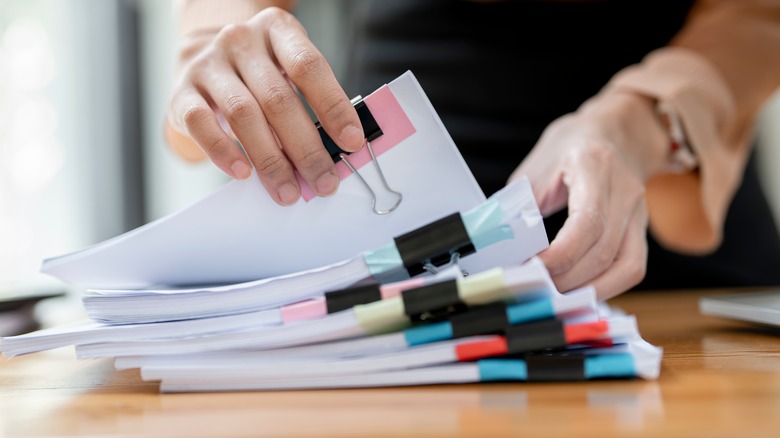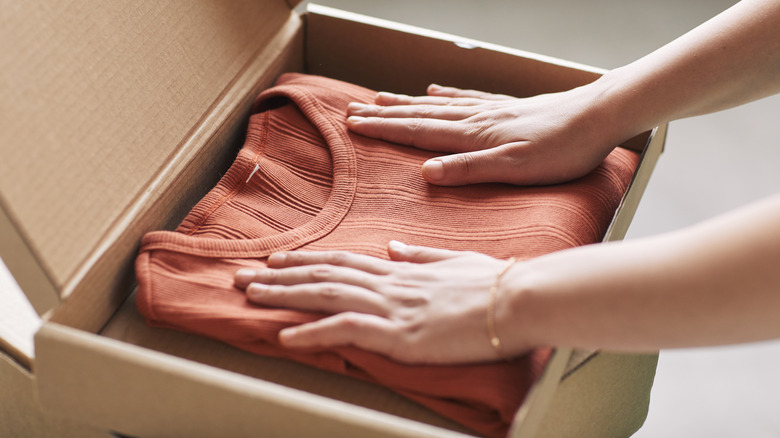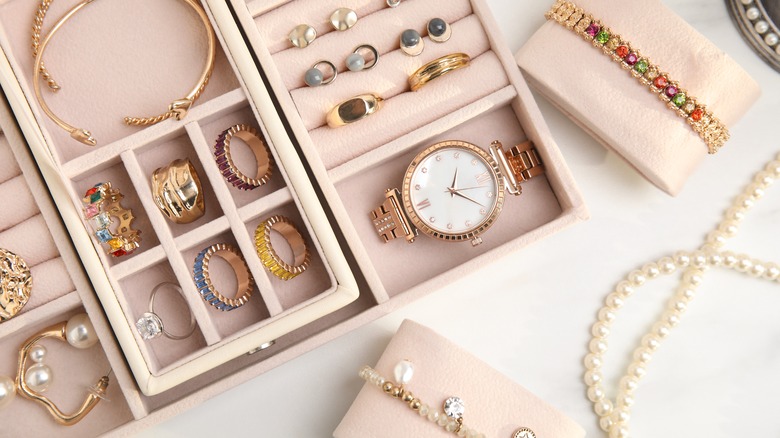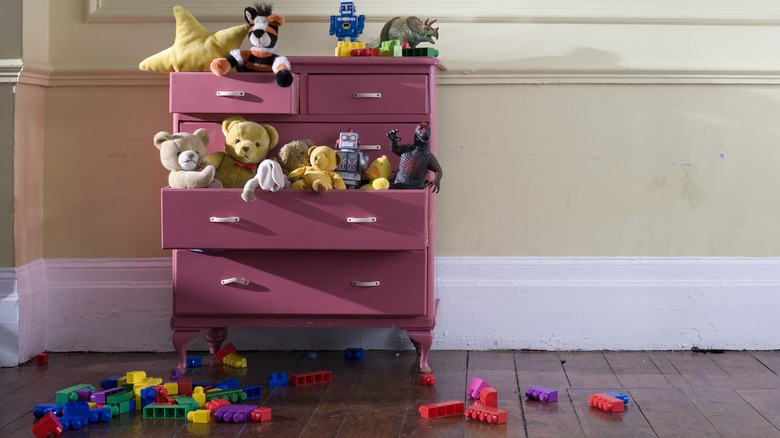Home Items You Really Shouldn't Be Storing In An Outdoor Shed
We may receive a commission on purchases made from links.
Outdoor sheds make great additions to any home, offering a convenient space to hold gardening tools, outdoor furniture, and more. However, not all items are suitable for shed storage. These buildings are typically not insulated like houses, so they experience extreme temperatures, which can be disastrous for many home items. They also have damp areas, especially those that aren't weatherproofed. Moisture and wet spots can ruin a lot of family belongings, even causing mold to grow on your favorite things.
Pests like rodents and insects may also be attracted to a shed, as they provide a safe space during harsh outdoor elements. Unfortunately, these small irritants will chew through nearly everything, including wood, fabric, and even some types of metal. Not everything is off-limits to your outdoor storage, however. You can safely keep outdoor equipment, patio furniture, seasonal items, and soil locked away. That said, there may be a few home items you're storing that really shouldn't be in a storage shed. Here's what to avoid keeping in outdoor storage and where to put your household items instead.
Your food surplus
Although it may be tempting to box up extra canned goods and keep them in your outdoor storage space, it's probably not the best idea. The primary reason is due to the temperature fluctuations, specifically extreme heat, in backyard sheds. These conditions can promote mold growth, potentially spoiling your food and making it unsafe to consume. Even if you have a nicer shed with climate control, it won't be enough to deter pesky animals like rats. Because these rodents have sharp teeth, they can chew through soft metals, like aluminum, and make the contents of your tinned goods their dinner.
Rather than storing food outside, consider optimizing your kitchen storage areas. Pantry organizers, stackable containers, and added shelving units are great options to do more with the space you have indoors. If you buy in bulk and have a large volume of non-perishable items, a basement or mudroom storage system may be worth looking into. By doing so, you can keep your food in an area with a consistent temperature and secure protection against pests.
Large bags of pet food
Dogs and cats seem to go through their chow quickly, so having extra on hand can mean fewer trips to the store. However, like human food, animal food comes with a risk in a hot and humid environment. Not only do these elements promote mold and bacterial growth, but they can also degrade the nutritional value of the pet's food. In addition to that, rodents and insects don't just enjoy feasting on our favorite meals; they'll gladly take a helping of what your pet is having, too. Unfortunately, mice often spread bacteria and viruses that can contaminate the kibble and make your furry friends sick. So, finding a better spot to keep the leftover pet feed is best.
Instead of keeping pet food in your shed, choose a temperature-controlled, dry place inside your home, like your pantry or basement. Even inside, use airtight containers for storage to maintain freshness and prevent pest exposure. If you purchase in bulk, make sure to check the expiration date and consider adding a dated label to the tub.
Your valuable electronics
In the age of technology, many of us have more electronics than we know what to do with. Even worse, a lot may be bulky and take up space in our homes. Unfortunately, storing these items in any outdoor spaces is not a good idea. Just like temperature and humidity levels can ruin food, it can also cause damage to electronic components, leading to malfunction or total failure. Secondly, moisture can seep into your devices, causing corrosion and short circuits. Objects with batteries can become damaged, and although rare, extreme heat can cause them to expand until they catch fire. Lastly, sheds typically aren't safeguarded against thieves, so your valuable electronics are at risk of theft.
To keep your electronics safe from damage or burglars, it's best to find storage in your home. For space issues, consider installing storage shelves in your finished basement or an under-utilized closet. If you don't have a good spot for your belongings, it may be a good idea to invest in either renting or purchasing a climate-controlled storage unit. For devices that aren't in regular use, properly clean and store them in protective casings to prevent dust accumulation. Remove any batteries to avoid leakage. By properly storing your electronics, you'll not only prolong their lifespan but also have a better chance of optimal performance when you plan to use them again.
Your collection of books
Book lovers know that reading and collecting books are two separate hobbies. If you don't have an entire home library, it's easy to accumulate until you run out of space. Unfortunately, outdoor sheds are one of the worst places to house your treasured reads. The delicate pages can warp, turn yellow, and grow mold on them from the fluctuating temperatures and moisture in the shed. Additionally, pests don't just munch on food; they're also attracted to paper and can significantly damage your books.
To keep your books looking good as new, it's best to keep them in a controlled indoor environment. Place your novels in a plastic tub and store them in a cool, dry place away from direct sunlight. One option is to get small bins that can fit under your bed or at the bottom of your closet. If you only have a few, books make stylish decor pieces to add to your coffee table, nightstand, hanging shelves, and other areas of your home. For a large collection, buying a dedicated bookshelf to display all your favorite reads may be worth your while.
Delicate wooden furniture
It can be challenging to part with beautiful wooden furniture, so you may be tempted to keep it stored away in your backyard shed. Whatever the case, you don't want to store wooden items in places with extreme temperatures or humidity. These conditions can cause the wood to crack, warp, or rot, significantly reducing its lifespan and aesthetic appeal. Like many of the other household items, infestations of pests, like termites, cause serious damage to wooden furniture.
Storing large pieces of furniture may be difficult, especially if you don't have a lot of extra space in your home. If you don't plan on using the pieces anytime soon, disassembling them may be your best option. Store the parts in a storage bin with a separate baggy for the hardware. For antique wooden furniture that you don't plan on keeping, consider selling it on online marketplaces like Facebook Marketplace or sell it to a consignment shop. If all else fails, see if any storage unit companies offer climate-controlled sheds to rent until you need the furniture again.
Your collection of artwork or irreplaceable photographs
Artwork and photographs are delicate items that require careful storage. Storing these pieces in an outdoor shed exposes them to humidity, fluctuating temperatures, and potential water damage. All of these conditions can cause irreversible harm. High heat levels can cause the materials to expand and contract, causing warping, color loss, and cracking. Humidity can encourage mold and mildew growth, which can stain or destroy the art or pictures. Moisture can also force the images to stick together, which makes it nearly impossible to take them apart without damaging them.
You should always store photos and artwork in a dry, cool place away from sunlight. Use acid-free materials for packing and framing to prevent damage to the artwork over time. Use a duster cloth with soft strokes on each picture and work of art to gently remove any dust and debris before storing. If you have several items, you might want to consider a professional storage solution. Some companies even offer climate-controlled storage units designed for artwork.
Important documents you will need in the future
Documents, especially those of importance like legal papers and financial records, should be kept in a safe space. Varying temperatures and humidity levels can lead to the deterioration of paper, causing it to turn yellow, become brittle, and even disintegrate over time. Sheds are often prone to water leaks and pest infestations, which adds more potential for damage. Aside from physical destruction, it's also risky to have valuable information in a place where it could easily get into the wrong person's hands.
Filing cabinets or a fireproof safe will be your best bet for organizing all the papers in your home. For added protection, add the sheets in plastic sleeves or envelopes before storing them. If you have a large volume of documents, scanning them into a digital filing system can help you rid your space of excess clutter. Most companies also offer a digital receipt or statement option, which can help put a stop to mail filling up your coffee table.
Seasonal clothing that you rotate
For those living in an area with all four seasons, it can be a struggle trying to keep up with storing your off-season clothing. However, you don't want to free up your closet space by adding your sweaters and jeans in the shed over the summer. Humidity can cause clothes to get moldy or mildewy, and sunlight can cause colors to fade. If dust settles into the fabric, you may find a few more stains than before you put your clothes in the shed. Additionally, pests like moths or rodents are common in sheds and will eat away at the fibers.
Before you store anything, go through each article of clothing and use this as a time to determine what you want to keep and what you want to toss. Run everything through the washer to remove any dirt or oils that could embed into the fibers. Like other sensitive home items, clothing should be kept in a cool and humid-free area. If your closet is large enough, adding a dresser could give you plenty of space to store garments you don't plan on wearing for a few months. If you don't have much free space, use vacuum seal bags to make the pieces more compressed, and consider storing them in squat storage boxes underneath beds and couches.
Valuable items
Whether you have valuable antiques, precious jewelry, or extra money, you want to ensure you're keeping it in a safe place. Not only are sheds unsafe in regard to break-ins, but environmental factors can harm many of your valuables. Items like jewelry, silverware, coins, and antique metals can tarnish or become discolored. Gemstones are also susceptible to heat, which can cause the colors to become less vibrant. High temperatures can also cause metals to expand, weakening them and possibly even causing warping or breakage. Paper money can become brittle, moldy, or snacked on by common outdoor shed pests such as mice or termites.
Keep your valuables locked safely inside, ideally with a home safe. Consider a jewelry box for necklaces, rings, watches, and other high-value accessories with a soft lining to keep the metals shiny and protected from scratches. Some boxes even have locks on them for an added safeguard, such as this multi-tier one from Amazon for $40. If you don't want to keep valuables in your house, a safety deposit box at the bank will provide you with high levels of security and ensure your valuables are protected from elemental, fire, and flood damage.
Overflow of kids toys
Between holidays, birthdays, and random surprises, kids' toys can accumulate quickly. While keeping the clutter at bay is a must, some kids' toys aren't suited for the conditions in your backyard storage. Plastic toys can warp or crack in hot conditions, while fabric toys may become moldy or attract pests if there's humidity or a leak. Sunlight exposure can cause bright-colored items to fade, reducing the appeal for children.
Clean all of the kids' toys, and choose a clean, dry area for storage. Storage solutions like toy chests, bins, and hanging organizers can keep any items they aren't using out of sight. Swap out storage toys every few months to keep the toys fresh and interesting. For kids with a heaping pile of stuffed animals, a storage bean bag chair is a game changer. Not only do you get to enjoy a clean playroom, but the little ones will love snuggling up on their new lounger.

